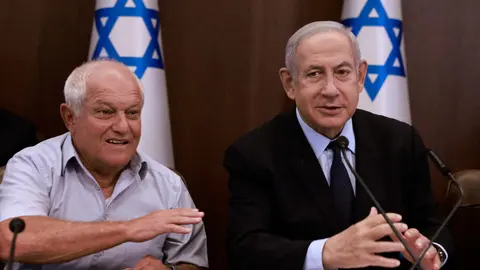Saudi Arabia says the Arab Peace Initiative will be an essential part of normalisation with Israel

Everything seems to indicate that the Middle East is about to witness one of the most relevant events in recent years, which will undoubtedly mark a turning point in the region. Normalisation between Saudi Arabia and Israel could happen sooner than expected, given the latest statements by senior officials from both countries, as well as the efforts made by the United States to bring its two main allies in the region to an agreement.
In the midst of this rapprochement with Israel, Riyadh has also not forgotten the Palestinians, who have considered any agreement between the Arab countries and the Jewish state to be a betrayal.
For this reason, last August the kingdom appointed for the first time a consul in Jerusalem in order to 'strengthen relations' between Riyadh and the Palestinians. This decision was also intended to reassure Ramallah amid rumours of a possible normalisation with Israel.
Now, after Saudi Crown Prince Mohammed bin Salman's statement that a normalisation agreement is "closer every day" and after Israel's Minister of Tourism Haim Katz visited Riyadh, becoming the first Israeli minister to travel to the Kingdom, the Saudi authorities have again had to calm the mood in Ramallah.
Watch: Nayef al-Sudairi, recently named Saudi ambassador for the Palestinian territories and consul general for #Jerusalem, presents credentials to top #Palestinian diplomat Riyad al-Maliki in a “historic” visit.#SaudiArabia #Palestine
— Al Arabiya English (@AlArabiya_Eng) September 26, 2023
Read more: https://t.co/RwmBv9ragn pic.twitter.com/jU3qCz94N8
In this regard, and following the steps towards rapprochement, the Saudi envoy to Palestine has assured that the Arab Peace Initiative proposed by Riyadh in 2002 will be "an essential part" of any possible normalisation agreement with Israel.
"The Palestinian issue is a fundamental pillar," stressed Nayef Al-Sudairi, the non-resident Saudi ambassador, after meeting in Ramallah with Palestinian Foreign Minister Riyad Al-Maliki, to whom he presented his credentials. "The Arab Initiative is the cornerstone of any forthcoming agreement," he added. This proposal calls for Arab relations with Israel in return for its withdrawal from the West Bank, East Jerusalem, Gaza and the Golan Heights, as well as a just resolution to the Palestinian cause.
During the meeting, Al-Sudairi recalled that in the past there was a Saudi embassy in the East Jerusalem neighbourhood of Sheikh Jarrah, and expressed the hope that "hopefully" a diplomatic mission would be opened again in the district. Al-Sudairi's trip to Ramallah, which was made overland from Jordan, represents the first Saudi diplomatic delegation to the West Bank since the Oslo Accords in 1993.
NEW: #Saudi Ambassador to the #Palestinian Authority Nayef Al-Sudairi presents his credential to President Mahmoud Abbas pic.twitter.com/HjhZSRplcC
— Michael A. Horowitz (@michaelh992) September 26, 2023
During his stay he is also scheduled to meet with Palestinian Authority President Mahmoud Abbas as well as other senior Palestinian officials.
At the centre of these talks will undoubtedly be the ongoing rapprochement with Israel and a possible normalisation agreement. Saudi Arabia could become the next country to recognise the Hebrew state a few years after the signing of the Abraham Accords, a milestone that has brought great benefits to the countries involved as well as to the region.
#BREAKING: First public visit by an Israeli minister in Saudi Arabia: Israeli tourism minister Haim Katz arrives in Saudi Arabia to attend a world tourism organization conference @UNWTO pic.twitter.com/frGBpqMAxf
— Amichai Stein (@AmichaiStein1) September 26, 2023
Moreover, thanks to an agreement with Israel, Riyadh could eventually sign a defence pact with the United States and receive Washington's support for its civilian nuclear programme. Joe Biden's administration would also benefit from normalisation, as this would be a success for its foreign policy just before the presidential elections and would counterbalance China's growing influence in the region.
For Israel, peace with Riyadh will represent yet another diplomatic achievement that will further its integration in the Middle East, forge new alliances in different areas, especially to face important challenges such as threats from Iran.










